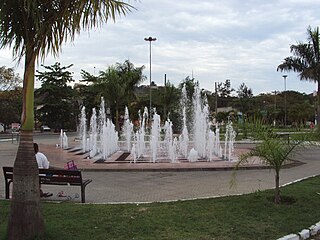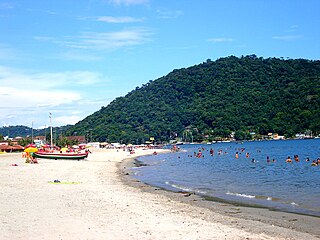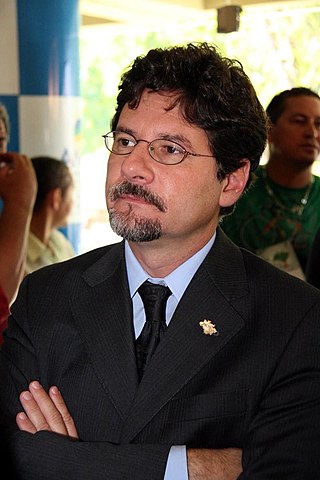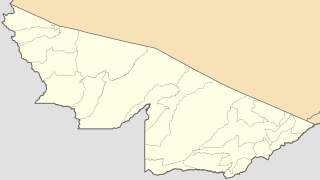In Brazil, the mayor is the chief executive of the smallest territorial unit — the municipality — and holds executive powers of the local government, in a "strong mayor-council" arrangement. In Portuguese, the mayor is called the prefeito or prefeita, while the government itself is termed the prefeitura.

Rio Branco is a Brazilian municipality, capital of the state of Acre. Located in the valley of the Acre River in northern Brazil, it is the most populous municipality in the state, with 387,852 inhabitants, according to 2024 IBGE estimates, almost half the state population. Rio Branco was one of the first settlements to develop in the region, being the westernmost major settlement in the country and the 4th-oldest state capital city in Northern Brazil, after Belém, Manaus and Macapá.

Volta Redonda is the name of a municipality in the Rio de Janeiro state of Brazil with an area of 182.81 km2, located from 350m to 707m above the sea level and with a population of 273,988 inhabitants. The area around the city has nearly 700,000 km2. Its name is due to the round shape of a curve in the Paraíba do Sul river around which the city was built.

Pato Branco is a municipality in the state of Paraná in Brazil. The municipality covers 537,8 km2 (206.7 mi2) and has a population of 83,843. Pato Branco started off as a village in 1942 and was given status as a city December 14, 1952. It has two private colleges, Faculdade Mater Dei and Faculdade de Pato Branco, and a campus of the Federal University of Technology - Paraná. The city has experienced a positive economic development throughout the last few years.

Três Rios is a municipality located in the Brazilian state of Rio de Janeiro. As of 2020 its population was an estimated 82,142 inhabitants, and its area is around 322 square kilometres (124 sq mi). The current mayor of Três Rios is Joacir Barbaglio Pereira of the Liberal Party, elected in 2020 to a four-year term.

Gramado is a municipality in the state of Rio Grande do Sul, Brazil. It is located in the Serra Gaúcha region. The city was originally settled by Azorean descendants and later received a contingent of German and Italian immigrants. Gramado is one of the cities along the scenic route known as Rota Romântica.

Cachoeiras de Macacu is a municipality located in the Brazilian state of Rio de Janeiro. Its population was 59,303 (2020) and its area is 956 km². Next to neighboring Rio Bonito municipality, it can be considered an exurb of Greater Rio de Janeiro metropolis.

Mangaratiba is a municipality located in the Brazilian state of Rio de Janeiro. Its population is 45,220 (2020) and its area is 352 km2.

Binho Marques is a Brazilian politician, and was the Governor of Acre from 2006 to 2010, when the government was assumed by Tião Viana. He is a member of the Workers' Party.

Brasilândia de Minas is a municipality in the state of Minas Gerais, Brazil.

Eduardo da Costa Paes is a Brazilian politician who became the mayor of Rio de Janeiro from 2009 to 2012, reelected for a second term from 2013 to 2016 and a third in 2021. He is the city's 13th mayor. On 12 August, at the 2012 Summer Olympics closing ceremony, he took the Olympic Flag, via Jacques Rogge, from London Mayor Boris Johnson.

The first round of the Acre gubernatorial election was held on 5 October 2014 to elect the next governor of the state of Acre. No candidate won 50% of the vote and thus a second-round runoff election was held on 26 October. Governor Tião Viana was re-elected for a second term.

The Brazilian municipal elections of 2016 took place on 2 October 2016 and on 30 October 2016. Electors chose mayors, vice-mayors and city councillors of all 5,568 cities of the country. The partisan conventions took place between 20 July and 5 August. The party political broadcast started on 26 August and ended on 29 September. Until 2012, on Mondays, Wednesdays and Fridays there was the broadcast for candidates to city halls, 30 minutes long. The broadcasts for candidates for city councils were broadcast on Tuesdays, Thursdays and Saturdays, also 30 minutes long. At least 97 cities had only one candidate for mayor in these elections. Besides that, 48.8% of the cities of the country didn't have more than two candidates. These were the first elections in which recently registered parties Partido da Mulher Brasileira (PMB), Rede Sustentabilidade (REDE) and Partido Novo (NOVO) participated; they were recognized by the Superior Electoral Court in 2015. Some of the most highlighted elected candidates include liberal businessman João Doria (PSDB) in São Paulo and licensed bishop Marcelo Crivella (PRB) in Rio de Janeiro. The elections also took place after the impeachment of Dilma Rousseff and during the investigations of Operation Car Wash. However, it only affected the left-wing Workers' Party, with its reduction of elected mayors, while the centre-right Brazilian Democratic Movement Party and Progressive Party, with the most of its members investigated, had an increase of elected candidates.

The 2020 Rio de Janeiro municipal election took place in the city of Rio de Janeiro, Brazil in November 2020 to elect a mayor, a vice mayor, and 51 city councillors for the administration of the city. On the 29 November 2020 run-off election, former mayor Eduardo Paes, of the Democrats (DEM), defeated incumbent mayor Marcelo Crivella of the Republicans (REP), who lost his bid for re-election.

Municipal elections took place in Brazil on 15 November 2020. Electors chose Mayors, Vice-Mayors and City Councillors of all 5,568 cities of the country. The partisan conventions took place between 31 August and 16 September. They were the first elections since Bolsonaro's election as President.

Popular Unity, also known as Popular Unity for Socialism, is a Brazilian political party founded on 16 June 2016, which had its right to launch candidacies recognized by the Superior Electoral Court (TSE) on 10 December 2019. As a socialist party, it is connected to homeless workers' movements and defends the nationalization of the banking system, social control of all monopolies, capitalist consortia, and the means of production at-large, as well as rural land reform and collectivization.

Farid Abrão David was a Brazilian politician of Lebanese descent, active in the municipality where he was born, Nilópolis, and more recently, in the neighboring city, Mesquita.

Ricardo Luis Reis Nunes is a Brazilian businessman and politician who is the current mayor of São Paulo, having assumed office on 16 May 2021 following the death of mayor Bruno Covas. He is a member of the Brazilian Democratic Movement.

Jairo Jorge da Silva is a Brazilian journalist and politician who was elected mayor of the city of Canoas, in the state of Rio Grande do Sul, in 2020. He had previously served in the position from 2009 to 2017, as well as a councilman in the city from 1989 to 1993.



















